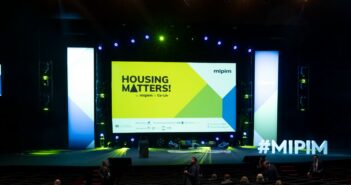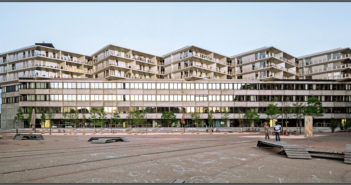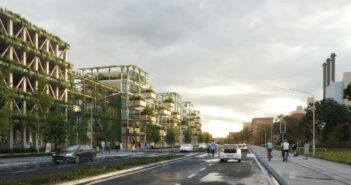As part of MIPIM 2020, I created an 8 hour playlist to be aired in the welcome area. The objective of the playlist was to relax attendees, provide a welcoming atmosphere and introduce the value that sound can have when it is strategically deployed in place. This small example demonstrates the impact that music and culture can have on real estate and that if we think about it early on as part of the design and masterplanning process it can add real value. Our objective was to build music into MIPIM, rather than bolt it on.
This is becoming increasingly important as the world – and our sector – is changing due to Covid-19. As we’re confined to our homes, we’re all turning to music, art, culture and community to retain contact with friends, families and neighbours. From the emergence of neighbours singing to one another, online choirs to famous artists performing in their homes via Instagram, we need culture to sustain social isolation. The need to come together – through Zoom, Instagram or other online platforms, has never been more important.
This social need highlights how we must change the way we design and implement the next generation of homes, shops, leisure facilities and neighbourhoods. While we are now comfortable coming together to share in an online concert, it may take many months, if not years, for similar comfort levels to rise to allow us to come together safely in small venues, theatres, arenas, large venues and stadiums. Two-metre spaced queues for supermarkets and newsagents may be the norm to continue social distancing requirements. Many design standards may no longer be fit for purpose.
Urbanists online are already discussing the need to explore better provision of outside space – will balconies become mandatory for every apartment? Will homes require more rigorous insulation and soundproofing, to enable us to shelter in place more comfortably, for longer and improve our efficiency standards? Will it become standard that infrastructure to support online performances – whatever they may be – be included in shell and core requirements for leisure venues such as restaurants, bars, nightclubs and music venues? Is the future of theme parks virtual? We don’t know the answer to these questions yet, but what is apparent is that the real estate sector should be the first to ask them and develop the best solutions. Because what we have been doing up till now is not working.
Despite music, culture and community being what we rely on in crisis, too often we build without their requirements and positive impact in mind. There are few standards for cultural or community viability in traditional development. Some countries have cultural quotas in mixed-use schemes, but many are used as quid-pro-quo negotiations to increase viability, rather than community impact vehicles. Yield remains the key decider, not the need for a place to be built to suit the people who will live, work and play there. This leads to disconnect in our cities that creates tensions in communities. The age-old desire to live in a vibrant neighbourhood but then be a victim of that vibrancy when inadequate glazing was approved is commonplace. This must be addressed in the design phase.
As a result, cultural infrastructure in our towns and cities is in crisis, despite the fact that we all rely on it. The playlist was a small gesture to promote the value that music – and culture in general – has in development. Given the theme of MIPIM was The Future is Human, the Covid-19 crisis is teaching us that the way we design, build and develop, often ignores the humans that the bricks and mortar are meant to service. When we are all locked in our houses, we turn to music, culture and community. When we’re let out, we will enter a world that is not geared to support this. This is an opportunity to change that.
Listen to the playlist here. If you’d like to add a track, let us know here.
Read Shain Shapiro’s other writing here.
Top Image: Getty Images – AntonioGuillem



